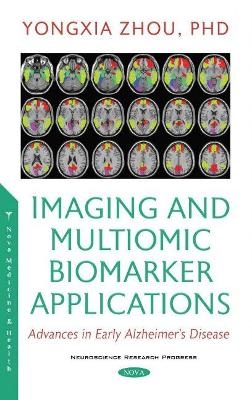The well-known Alzheimer's Disease Neuroimaging Initiative (ADNI) Center provides the most advanced, comprehensive, multiparametric and up-to-date biomarkers for mild cognitive impairment (MCI) and early Alzheimer's disease (AD) projects, including neuroimaging, clinical assessments, biospecimens and genetic data. Recent developments in imaging techniques, including new molecular tracers for imaging disease burden and systematic multi-modal integration, have emerged to overcome the limitations of each single modality and individual-dependent variability. The MRI-based high-resolution structural and morphological changes in the brain, such as atrophy, and the abnormal activity/connectivity patterns of the hippocampus subfields and default mode network (DMN) modulation, together with the amyloid and tau neuropathological quantification using PET molecular tracers, could be used to predict brain changes and cognitive performance declines in early AD, including transitional MCI. Finally, a generalized and integrative model with multiple biomarkers could be built to target disease progression and symptom prediction as well as to optimize patient management. Multiomics investigates metabolomic, lipidomic, genomic, transcriptomic and proteomic perspectives by presenting an accurate biochemical profile of the organism in health and disease. The Alzheimer's Disease Metabolomics Consortium (ADMC) in partnership with ADNI is creating a comprehensive biochemical database for patients in the ADNI1 cohort, consisting of eight metabolomics datasets. The vast majorities of biospecimen data provide rich biological information to the human brain at normal and dementia status. One of the purposes is to reveal the connections between disease and multiomics such as obesity, hypertension, cholesterol imbalance and inflammation risks that might lead to neurodegenerative disease. Multiomic biomarker developments in the dementia field have provided earlier clues to novel treatments that help correct metabolic dysfunction and delay disease progression. Furthermore, the assembling of multiomics-based biomarkers including metabolites and lipids, cholesterol biosynthesis, purine metabolism, lipoprotein, bile acids, and genetics as well as their relation to the pathological amyloid and tau network could improve disease diagnosis sensitivity and reveal more diverse and complementary molecular pathways to allow for the advancement of early AD diagnosis and therapeutic prevention. In this book, we report on the significant differences of multiple biomarkers from the ADNI database including neuroimaging, clinical assessments and multiomic biospecimen/genetic data in MCI and early probable AD (pAD), and elucidate the interconnections among different metrics at various domains. Classification results with high accuracies (0.95-1) for each early dementia subtype including early MCI (EMCI), late MCI (LMCI) and pAD, and better prediction of clinical symptoms is achieved with these comprehensive biomarkers. Further longitudinal changes of imaging and neuropsychological biomarkers, and inter-correlations with baseline parameters are examined for a better illustration of disease progression association. Additionally, an analysis of the post-traumatic stress disorder biomarkers is performed with high classification accuracy. With illustrative and rigorous data analyses and confirmative results, this book provides readers with a full spectrum of biomarker research for early dementia diagnosis and treatment, and helps convey the technical development and data evaluation perspectives in advanced medical imaging and various disease application fields.
Imaging Scientist, University of Southern California and Columbia University, USA.
Preface; Advances of Imaging Biomarkers in Mild Cognitive Impairment and Early Alzheimers Disease: Neuroimaging and Neuropsychological Abnormalities; Advances of Imaging Biomarkers in Mild Cognitive Impairment and Early Alzheimers Disease: Correlations and Classification; Investigation of Multiomic Biomarkers in Early Alzheimers Disease: Introduction and Abnormalities in Disease; Investigation of Multiomic Biomarkers in Early Alzheimers Disease: Neuroimaging Association and Classification; Longitudinal Changes of Multiple Biomarkers in Mild Cognitive Impairment and Early Alzheimers Disease; Investigation of Multiple Biomarkers in Post-traumatic Stress Disorder: Abnormalities and Disease Classification; Summary of Multiple Biomarker Results in MCI and AD; Index.



